| KEG: The critical moment that decided this game was identified by <yurikvelo> on this site over two years ago. Marshall had what was almost certainly a won ending, and blundered this all away on his 39th move. In fact, this game--one of many major disappointments for Marshall in the (for him) disastrous year 1901--was spotty from beginning to end. Marshall badly misplayed the opening and may have been strategically lost (as White!) as early as move 16 and--after Ward blew his edge--once again by move 19. But Ward misplayed his favorable position and was in a lost ending by move 23, got a reprieve from Marshall and was OK again after Marshall's weak 34th move, blundered himself back to a lost ending on his own 34th move, but wound up winning when Marshall overlooked a fairly obvious combination on move 39 and was then hopelessly lost. Not a game either player was likely to want to remember. From a sporting perspective, Marshall's loss here allowed the British team to salvage a draw in this ten-board match. 1. d4 d5
2. c4 e6
3. Nc3 Nf6
4. Bg5 Be7
5. Nf3 Nbd7
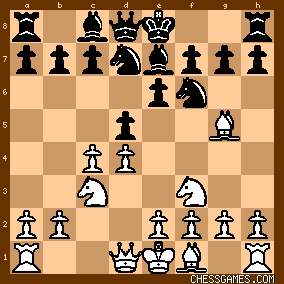
click for larger viewA standard position in the Orthodox Queen's Gambit Declined. 6. c5?!
Hardly to be recommended (best for White here is 6. cxd5 or 6. e3), though played by Marshall a couple of months earlier at Monte Carlo 1901 in his win against Mason (one of the few bright spots for Marshall at that tournament). 6... c6
Mason's move against Marshall at Monte Carlo 1901. 7. e3 e5
Mason had played 7...0-0. Both moves are reasonable, but the text is more dynamic. Ward may well have prepared this move in light of the earlier Marshall--Mason game. 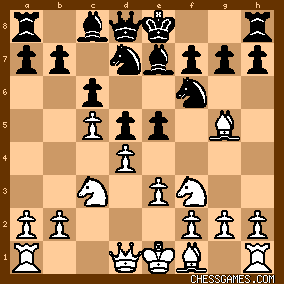
click for larger view8. dxe5
Marshall appears to have become flustered after Ward's 7...e5. Best was the developing 8. Be2 8... Ne4!
9. BxB QxB
10. NxN dxN
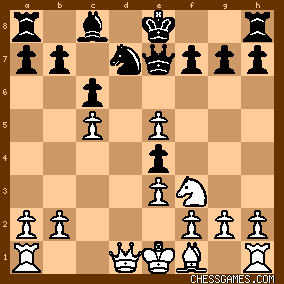
click for larger viewThough playable, this is not a great position to achieve as White after just 1- moves. 11. Nd2 Nxc5
12. Nc4 0-0
13, Qd6
Marshall was reduced to seeking a trade of Queens to hold his own. 13... Re8

click for larger view14. 0-0-0?
Wild and unsound, but characteristic of what Soltis has aptly called Marshall's "sophomore slump" (i.e., his awful 1901 after his fine result at Paris 1900). 14... Be6
15. QxQ
Marshall had nothing much better than to enter an inferior ending. 15... RxQ
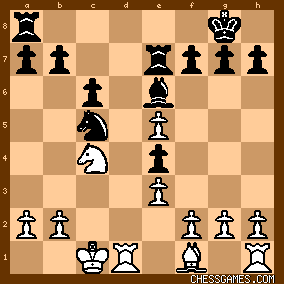
click for larger view16. b4?
This manic effort to create complications might have lost Marshall the game. Better were 16. b3 (so the a-pawn doesn't hang later), 16. Rf4, or even 16. Kc2. After 16. b4?, the position was:
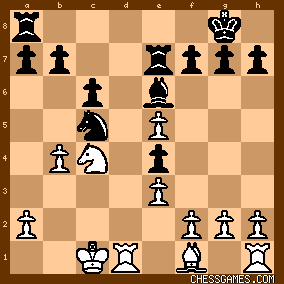
click for larger view | 




